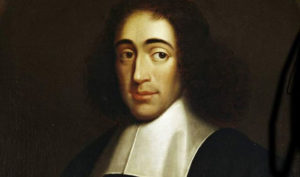When he was only 23, Baruch Spinoza (1632-1677) was excommunicated from the Jewish community in Amsterdam. His precocious intellect has already formed and argued themes that were to be developed into his mature works, Theological-Political Treatise (published anonymously in 1670) and Ethics (1677). The excommunication document said, in part:
“no one should communicate with him, not even in writing, nor accord him any favor nor stay with him under the same roof nor within four cubits in his vicinity; nor shall he read any treatise composed or written by him.”
Religious free-thinking was widespread among European intellectuals in the 1600s, in large part due to the influence of giants such as Galileo Galilei, who had argued for the peaceful co-existence of science and religion (1615), René Descartes, who had insisted that first we know ourselves and only then God (1637), and John Milton, who had pressed for wide-ranging free speech (1644).
But Spinoza seemed a special threat to his Jewish community, in part because they were concerned to protect the tolerance they enjoyed in the Netherlands, so they did not want to risk suppression or expulsion by harboring a religious radical. But they were also offended by Spinoza’s free-thinking themes, among them that:
* Religion is organized superstition. It is based on the fears of naive ordinary people in the face of unpredictable nature, and clever power-hungry leader-types use those fears to control people.
* We should interpret the Bible as a work of human literature, “instead of rashly accepting human commentaries for Divine documents” (TPT Chapter 7), and the prophets were merely imaginative and charismatic individuals who inspired others to exalt them:
“the power of prophecy implies not a peculiarly perfect mind, but a peculiarly vivid imagination” (Chapter 1).
* Miracles do not happen, as the laws of nature rigorously express God’s attributes without exception: “Nature cannot be contravened, but that she preserves a fixed and immutable order.” Yet the masses “style unusual phenomena ‘miracles,’ and partly from piety, partly for the sake of opposing the students of science, prefer to remain in ignorance of natural causes” (Chapter 6).
* The Jews are not God’s specially chosen people, and when the Bible seems to speak to the Hebrews alone, “it speaks only according to the understanding of its hearers.” Spinoza further admonishes those who seek favoritism:
“Every man’s true happiness and blessedness consist solely in the enjoyment of what is good, not in the pride that he alone is enjoying it, to the exclusion of others. He who thinks himself the more blessed because he is enjoying benefits which others are not, or because he is more blessed or more fortunate than his fellows, is ignorant of true happiness and blessedness, and the joy which he feels is either childish or envious and malicious.” (Chapter 3)
The Treatise is a provocative and timeless work. Even three and half centuries later, how widespread is agreement about Spinoza’s closing sentiment?
“In a free state every man may think what he likes, and say what he thinks.” (Chapter 20)
Related:
Why Spinoza still matters.
Spinoza’s Ethics, Demonstrated in Geometric Order.

The penultimate quote is something that the modern Left should be reminded of on a daily basis. Their entire political strategy at this point consists of “Other people have lives better than yours, and you should be mad as hell about it.” That’s not to say that the Right is any better–I believe that Trump was elected because lower- and lower-middle-class Americans realized that they, too, could act as an oppressed group. But the Left has made a study of this method for grooming voters for several generation.